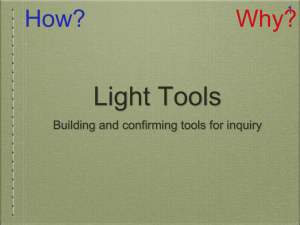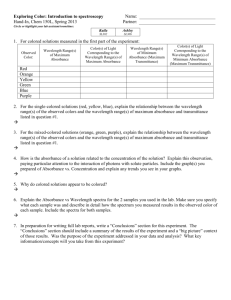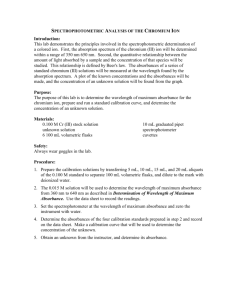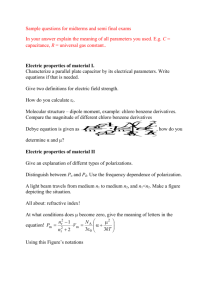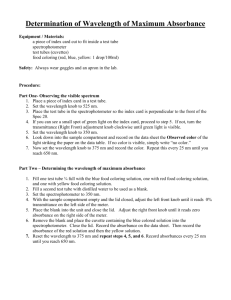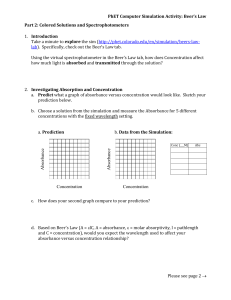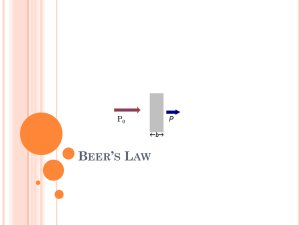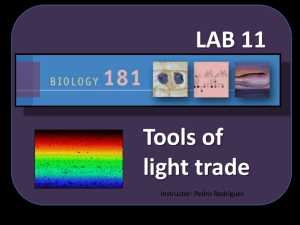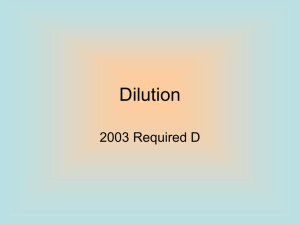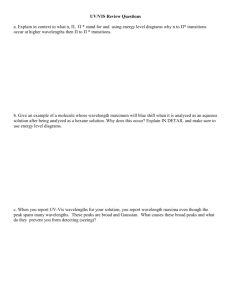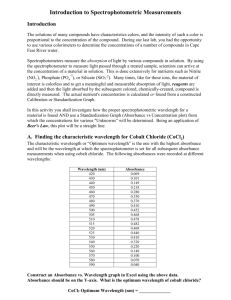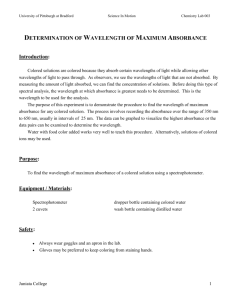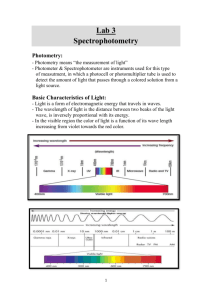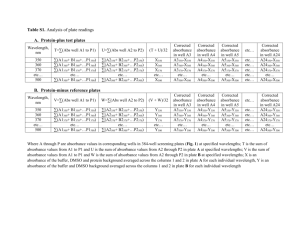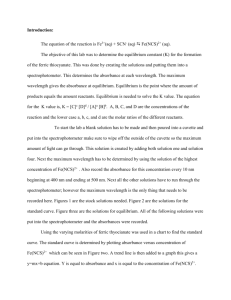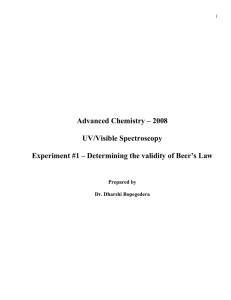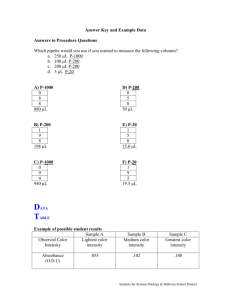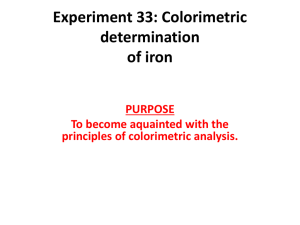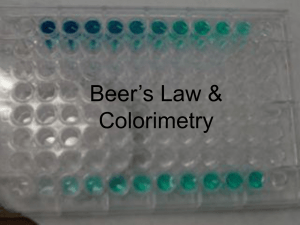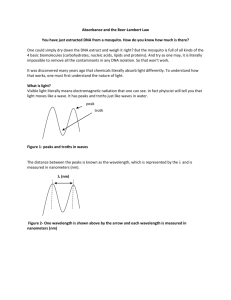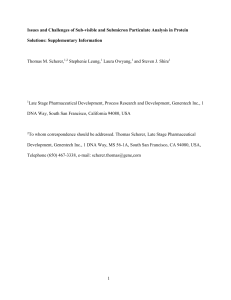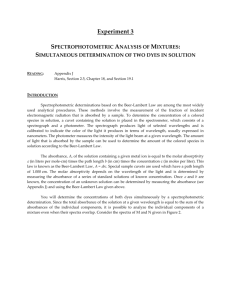Light Tools
advertisement
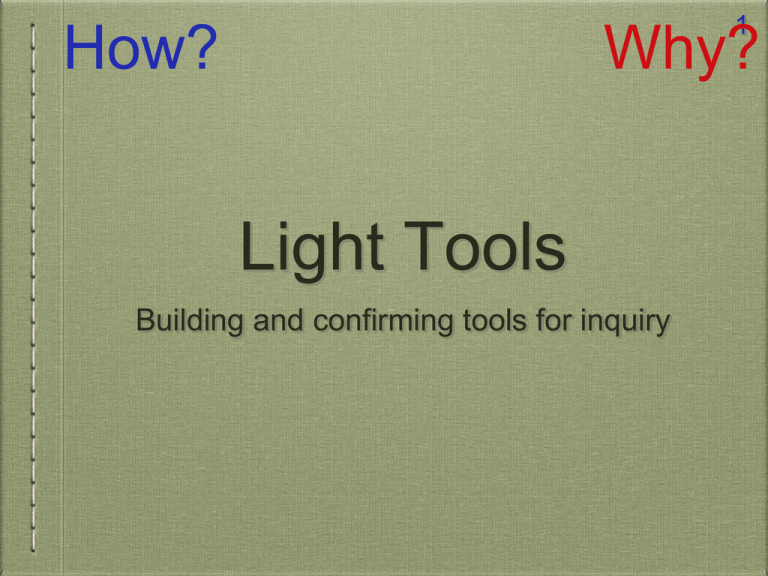
1 How? Why? Light Tools Building and confirming tools for inquiry Think with me • Why do you see colors when some chemicals are flamed? • Why do different chemicals => different colors? • Assertion I: (proposed model): unlike planets, electrons are only allowed discrete energies* • Assertion II: Energies that don’t take an electron to an allowed place are ignored by the electron, doesn’t move *If the earth should stop revolving, Spinning slow enough to die... --IF, David Gates (Bread) 2 Hydrogen Atom Simulator 3 (Dan Damelin) • http://chemsite.lsrhs.net/FlashMedia/html/flashEMR.h tm • Also in Further Explorations • Predict: what happens to an arbitrary-energy photon? • Predict: what happens to one that matches a difference between current and potential orbital Set ‘pause mode’ to on 4 Why are there holes in sunlight? Assume: the light is ‘born’ as all wavelengths http://antwrp.gsfc.nasa.gov/apod/ap070624.html 5 Tool using How are these different? • Using a thermometer to test temperature • pointing stick at sky, say magic words, wait for rain • using ‘pH paper’ to count ‘protons’ • using the Ba(OH)2 ‘test for’ carbon dioxide • counting geigs with a Geiger counter • believing in ‘global climate change’ Any sufficiently advanced technology is indistinguishable from magic. --Arthur C. Clarke 6 Rankings 7 • Empirical--you saw it, touched it, etc. • Reasoned argument from documented/identified assumptions & previous knowledge • Repeatedly established by others • Never: assertions by authority regardless of the nature (or volume) of that authority Suck it & see 8 • We’ll have tubes with chalk or filter paper; drop these in the specs • Look at the beam (far red may be hard to see) • slowly and carefully move the wavelength selector • Look again • Reset spec to wavelength indicated on machine Driving Ms. Spec Set wavelength Set for infinite absorbance (blocked path) Set zero absorbance Be careful when setting infinite absorbance! Tick mark, NOT infinity symbol 9 Calibrating your eye • Graph paper pp. J-13 to 20 • Predict: how will a blue liquid absorb? A green one? • Draw the graph (wavelength vs. absorbance) 10 To your specs! • On your desk is a bank of tubes • Find the absorbance of each at each wavelength • Zero machine EACH time you go to a new one! Don’t trust those ahead of you or the machine to stay zeroed 11 Data (one per person) Blue Violet Red Green Yellow 350 430 500 590 630 660 This should take 15’. leaf 12 Graphing • Create a graph and table for HW • Separate graph for each color allows you to more easily visualize the behavior of each color • Make a NEW table to turn in because you will need your old table next week in class • See rubric!!! • How is a table useful? A graph? 13 FYI: Dye Structures 14 Napthol Green FDC Yellow5 Yellow Crystal Violet FDC Blue1 FDC Red 3 The Joy of Dilution • What fraction of molecules would you have to remove for there to be 1/2 as many collisions between beam & dye? • OK, build a solution with 1/4 absorbance of stock (2 ways about this) • • Confirm by checking initial absorbance at a wavelength that it will likely absorb HIGH, and final absorbance at the same wavelength • Is it 1/4 the initial absorbance? Tubes should be covered with parafilm 15 16 Photosynthesis “Makin’ things with light*” *Lite-Brite ad jingle 17 Flight of the electron 18 Photosynthesis: Intro What’s in a leaf • Predict: what will we find when we grind up a leaf? • Protocol: p. 11-3 • Graph absorption of spinach extract • ‘ultra’-violet light it (high or low energy)? • Note!! These wavelengths re-do your DNA!! 19 20 Fashioning an assay Using the oxygen that plants belch out Photosynthesis 6CO2 + 6H2O Light C6H12O6 + 6O2 21 22 Deflating, inflating a leaf • If we deflate a leaf, what will happen if we put it in a beaker of water? • How can you tell if photosynthesis is happening? • What are the inputs of photosynthesis? The products? • How can you test for these? Doing it! 23 • Cut out 5-7 leaf disks with hole punch, suction air out in syringe (half full with buffer) until they all sink too much and they will die • Buffer solution – keeps them at a happy pH • Set up in small beaker under the lights in 20mL of buffer, observe! • This is practice for next week! 24 Next week! • You’ll take the data you have from this week to create a red-passing, bluepassing or green-passing solution • This will be used to test whether different portions of the visible spectrum are equally potent for photosynthesis Sadava, Life, Fig. 8-6 25 Semester project! • Resume experimenting in 2 weeks • Remember to email me if there were extra supplies you needed by November 5! • Reports due the week after Thanksgiving Presentations • Last presentations in 2 weeks 26 Table & Graph of absorbance data Dilution worksheet (pp. 11-9 & 10) Homework
